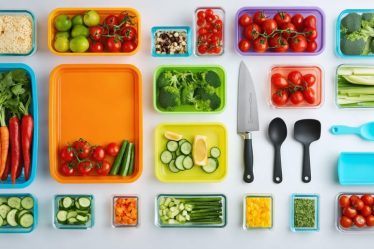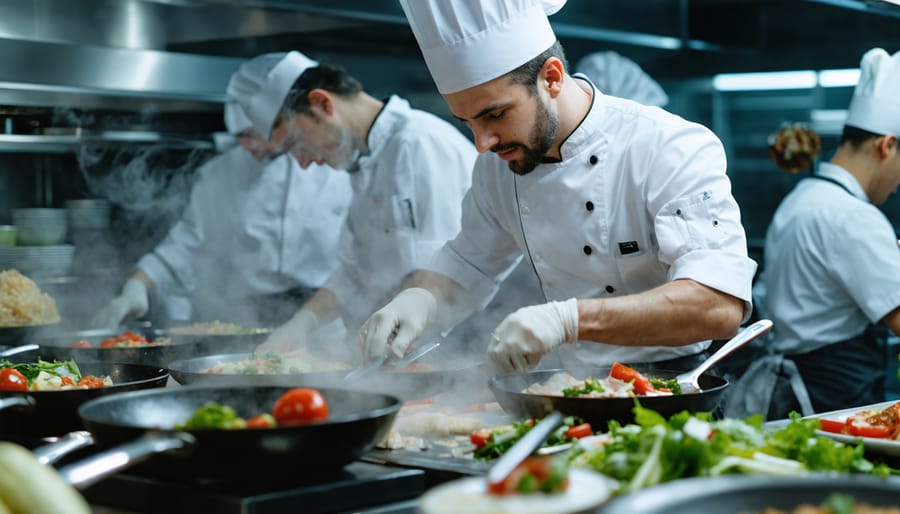
Picture yourself in a bustling restaurant kitchen – the sizzling of pans, the artistic plating of dishes, and the infectious energy of a team working in perfect harmony. For many aspiring chefs, this scene represents more than just a workplace; it’s a calling. The culinary world has evolved far beyond traditional restaurant kitchens, offering diverse career paths from food styling and recipe development to private chef services and culinary education.
Yet beneath the glossy Food Network shows and Instagram-worthy dishes lies a career that demands unwavering dedication, physical stamina, and a genuine passion for the craft. With the global food industry experiencing unprecedented growth and the rise of food-focused social media creating new opportunities, aspiring culinary professionals face both exciting possibilities and significant challenges.
Whether you’re a home cook dreaming of professional kitchens or a career changer seeking a more fulfilling path, understanding the realities of a culinary career is crucial. This comprehensive guide will help you navigate the heat of the kitchen, explore various career opportunities, and determine if culinary arts is your recipe for success. Let’s dive into the ingredients that make up a successful culinary career and honestly assess if this dynamic field aligns with your professional aspirations.
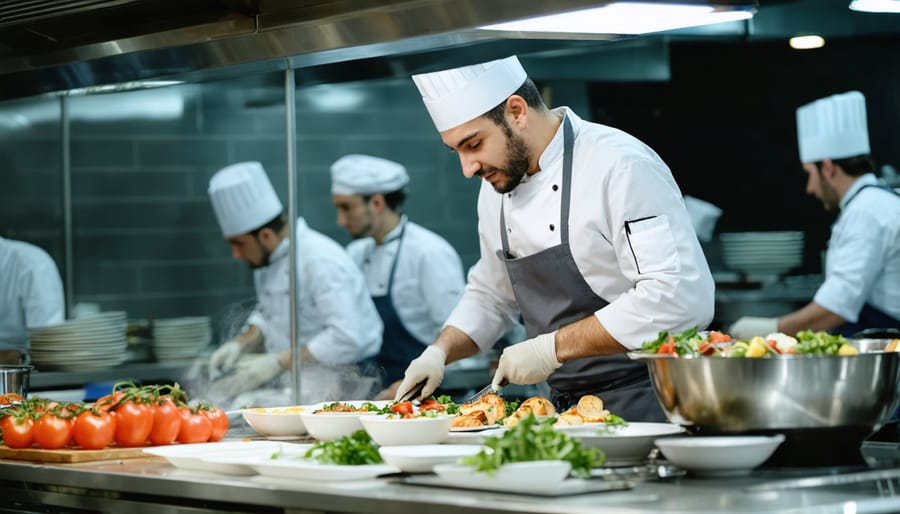
What Really Happens in a Professional Kitchen
The Physical Demands
Let’s be honest – the culinary world isn’t for the faint of heart! As someone who’s spent time in professional kitchens, I can tell you that the physical demands of this career are significant. Picture yourself standing for 10-12 hour shifts, often without breaks during peak service times, especially in a fine dining experience setting.
The kitchen environment is consistently hot and fast-paced. You’ll be lifting heavy pots, carrying large bags of ingredients, and maneuvering through tight spaces with hot plates and sharp tools. Your body needs to be ready for constant movement – from chopping vegetables and stirring sauces to reaching for high shelves and bending to access lower storage areas.
The heat from multiple stoves and ovens running simultaneously can make the kitchen feel like a sauna, and you’ll need to maintain your focus and precision despite these challenging conditions. Your hands will be your most valuable tools, facing constant exposure to heat, cold, and sharp objects.
While these demands might sound daunting, many chefs find them invigorating and consider them part of what makes the profession so rewarding. The key is understanding these physical requirements before diving in and maintaining good self-care practices to sustain your energy and health long-term.
The Mental Challenges
Let’s be honest – the culinary world isn’t just about creating beautiful dishes and receiving compliments from satisfied diners. Behind those perfectly plated meals lies a mentally demanding profession that requires exceptional resilience and focus. As someone who’s spent time in professional kitchens, I can tell you that the mental challenges are very real.
Picture yourself juggling multiple orders during a busy dinner service, while maintaining precise timing and unwavering attention to detail. The pressure can be intense, with tickets piling up and the heat (both literal and figurative) rising in the kitchen. You’ll need to master the art of multitasking – monitoring several dishes simultaneously while coordinating with your team and keeping track of specific dietary requirements.
The fast-paced environment demands quick decision-making and adaptability. When a dish doesn’t turn out perfectly or a customer sends something back, you need to maintain composure and problem-solve on the spot. The perfectionist nature of culinary work can also take its toll – many chefs struggle with the constant pursuit of excellence and the fear of criticism.
But here’s the silver lining: these challenges help build incredible mental strength and resilience. Many successful chefs will tell you that learning to navigate these pressures has made them stronger both professionally and personally.
The Financial Reality of Culinary Careers
Entry-Level Expectations
Let’s be honest – when you’re first starting in the culinary world, you’ll need to embrace the journey from the ground up. Entry-level positions typically begin with salaries ranging from $25,000 to $35,000 annually, depending on your location and the type of establishment. But don’t let these initial numbers discourage you!
I remember my friend Sarah, who started as a prep cook making just above minimum wage. She viewed each shift as a paid learning opportunity, mastering knife skills and kitchen efficiency while earning her stripes. Many successful chefs started exactly this way.
You’ll likely begin in positions like prep cook, line cook, or kitchen assistant. These roles typically require working evenings, weekends, and holidays – it’s part of the restaurant life! The good news is that advancement can happen relatively quickly for dedicated individuals who show initiative and reliability.
The first few years are about building your foundation. Expect physically demanding work, long hours on your feet, and a fast-paced environment. You’ll need to demonstrate basic knife skills, understand kitchen safety protocols, and work well under pressure. Many establishments also look for ServSafe certification, which is relatively affordable and achievable.
While the starting pay might seem modest, remember that culinary careers often come with additional perks like meal benefits, health insurance (in larger establishments), and the invaluable opportunity to learn from experienced chefs.
Growth Potential
One of the most exciting aspects of a culinary career is its remarkable growth potential. I remember chatting with my friend Sarah, who started as a line cook and now owns two successful restaurants in Chicago. Her journey perfectly illustrates how far you can go in this field with dedication and passion.
The culinary world offers numerous paths for advancement. You might start as a prep cook, progress to line cook, then sous chef, and eventually become an executive chef. But that’s just one possible route! Many culinary professionals branch out into specialized roles like pastry chef, food stylist, or restaurant consultant.
Salary progression in the culinary field can be particularly rewarding. While entry-level positions typically start around $30,000-$35,000 annually, experienced executive chefs at high-end restaurants can earn well over $80,000 per year. Some celebrity chefs and restaurant owners even reach seven-figure incomes.
Beyond traditional kitchen roles, the rise of food media, cooking shows, and social media has created exciting new opportunities. From food photography to recipe development for major brands, the possibilities keep expanding. Many culinary professionals also find success in food writing, teaching, or launching their own YouTube channels.
Remember, each step up the ladder not only brings better compensation but also the chance to express more creativity and leadership in your work. The key is to stay curious, keep learning, and be open to opportunities as they arise.
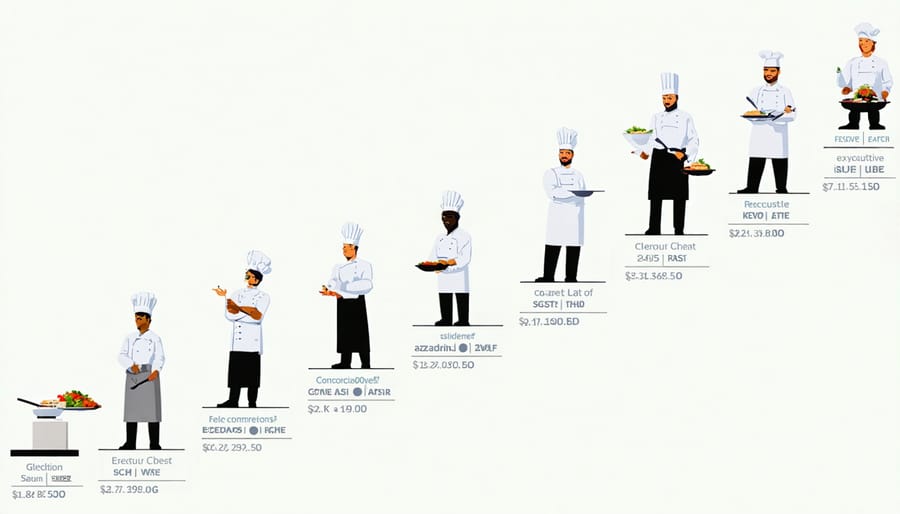
Alternative Paths in the Culinary World
Private Chef Opportunities
Have you ever dreamed of creating culinary masterpieces in stunning private homes? As a private chef, you can turn that dream into reality while enjoying flexible hours and creative freedom. This growing career path offers a unique blend of entrepreneurship and culinary artistry, perfect for those who love intimate cooking experiences.
Private chefs typically earn between $65,000 to $120,000 annually, with top professionals commanding even higher rates. Beyond the attractive salary, you’ll have the opportunity to develop specialized cuisine techniques while working directly with clients who appreciate your craft.
I recently spoke with Maria, a private chef in Vancouver, who shared that her favorite part of the job is creating personalized menus that reflect her clients’ dietary preferences and cultural backgrounds. “Every day brings a new creative challenge,” she explained, “and the personal connections you build are priceless.”
The path to becoming a private chef often starts with formal culinary training, followed by experience in professional kitchens. Many successful private chefs also build their personal brands through social media and word-of-mouth referrals. This career option offers the perfect balance for those who want to combine their love of cooking with the independence of running their own business.
Consider starting with small dinner parties or weekly meal prep services to build your reputation. As your client base grows, you can expand into exclusive events and long-term private chef positions.
Food Media and Innovation
The digital age has opened up exciting new avenues in the culinary world that go far beyond traditional kitchen roles. If you love food but want to explore creative alternatives, consider the booming world of food media and entrepreneurship. From Instagram food photography to YouTube cooking channels, content creators are building thriving careers by sharing their culinary passion online.
Many successful chefs have expanded their influence through food blogging, podcast hosting, and developing their own product lines. These roles often combine culinary expertise with beverage service skills and business acumen, creating diverse income streams. I’ve seen countless talented cooks transform their kitchen experience into thriving personal brands and digital enterprises.
Food styling and photography have become particularly lucrative specialties, with brands constantly seeking fresh content for their social media presence. Recipe development and food writing for magazines, websites, and cookbooks offer another creative outlet that can be both fulfilling and profitable. The best part? Many of these opportunities allow you to work remotely or set your own schedule.
Food-focused entrepreneurship is also on the rise, with innovative concepts like meal prep services, specialty food products, and virtual cooking classes gaining popularity. These ventures allow culinary professionals to combine their kitchen expertise with modern business models, often reaching global audiences from their home base.
Education and Training Requirements
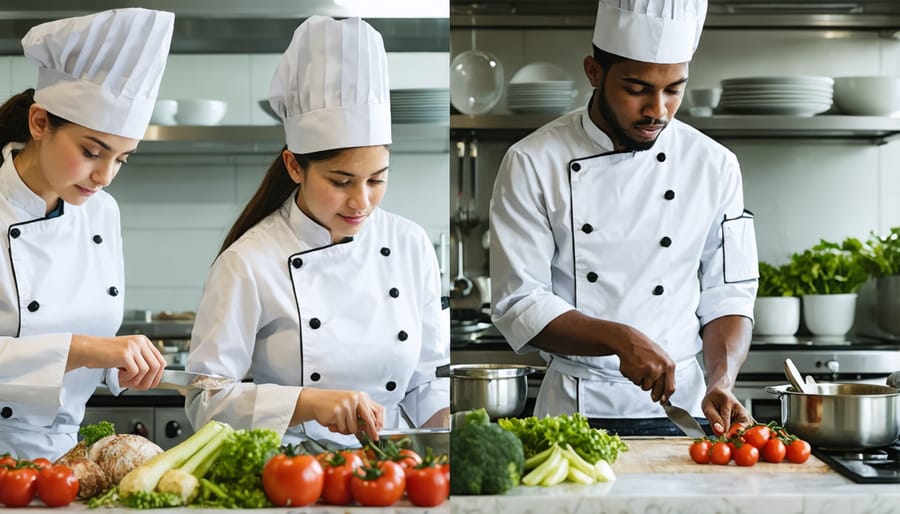
Formal Education vs. Experience
When it comes to pursuing a culinary career, there’s often a lively debate between formal education and hands-on experience. I’ve talked with countless chefs who’ve taken different paths, and here’s what I’ve learned: both routes can lead to success, but they offer distinct advantages.
Culinary school provides a structured foundation in techniques, food safety, and kitchen management. You’ll learn classic methods, gain networking opportunities, and often graduate with an impressive credential. Many graduates appreciate having a comprehensive understanding of various cuisines and cooking styles before entering the workforce.
On the flip side, starting in a restaurant kitchen offers immediate real-world experience and income. You’ll learn practical skills, develop speed and efficiency, and understand the true pace of a professional kitchen. Many successful chefs started as dishwashers and worked their way up, learning every aspect of kitchen operations along the way.
The best path often depends on your learning style and financial situation. Some choose to combine both approaches – working part-time while attending culinary school or pursuing formal education after gaining some experience. Remember, regardless of your chosen path, passion, dedication, and a willingness to learn continuously are the key ingredients for success in the culinary world.
Essential Skills and Certifications
Success in the culinary world requires a blend of technical expertise and soft skills that you’ll develop throughout your journey. First and foremost, you’ll need solid knife skills and an understanding of various cooking techniques – these are the foundations of any culinary career. Time management and organization are absolutely crucial; I’ve learned from experience that a well-organized kitchen is a successful kitchen!
Beyond the basics, you’ll want to develop a keen palate and understanding of flavors, ingredients, and food science. Many aspiring chefs enhance their credentials through professional certifications in specific areas like pastry arts, wine pairing, or international cuisines.
Essential skills also include:
– Menu planning and food costing
– Kitchen safety and sanitation practices
– Team leadership and communication
– Inventory management
– Basic math skills for recipes and portions
– Physical stamina and stress management
Remember, while formal education isn’t always mandatory, health and safety certifications like ServSafe or your local food handler’s certification are typically required. The most successful culinary professionals I know never stop learning – they’re constantly exploring new techniques, flavors, and trends to stay current in this dynamic field.
Deciding whether to pursue a culinary career ultimately comes down to your personal passion, goals, and lifestyle preferences. As someone who’s spent countless hours talking with both seasoned chefs and career changers, I can tell you that success in this field isn’t just about loving to cook – it’s about embracing both the challenges and rewards that come with it.
From my experience working with aspiring chefs, those who thrive in culinary careers tend to possess a unique combination of creativity, resilience, and practical skills. The road isn’t always easy – the long hours, physical demands, and initial lower wages can be challenging. However, for many, the satisfaction of creating beautiful dishes, the thrill of a busy service, and the joy of making people happy through food make it all worthwhile.
Think of a culinary career as a journey rather than a destination. You might start in a traditional restaurant kitchen, but your path could lead to food styling, recipe development, restaurant ownership, or even culinary education. The field is continuously evolving, especially with the rise of social media, food blogs, and specialty dining experiences.
Before making your decision, I encourage you to:
– Stage (intern) at different restaurants to experience the environment firsthand
– Connect with working chefs to learn about their experiences
– Consider your long-term lifestyle goals and how they align with the demands of the profession
– Evaluate different culinary career paths beyond traditional restaurant work
– Be honest about your financial expectations and planning
Remember, success in culinary arts doesn’t always mean becoming a celebrity chef or owning a Michelin-starred restaurant. Many find fulfillment in smaller, more intimate settings, teaching others, or specializing in niche areas like pastry arts or food photography.
If you feel that familiar flutter of excitement when you think about spending your days creating beautiful food and bringing joy to others through your culinary creations, then yes – a culinary career could be an excellent choice for you. Just approach it with realistic expectations, a solid plan, and the understanding that like any worthwhile pursuit, it requires dedication, continuous learning, and passion.


